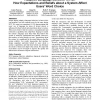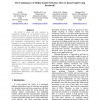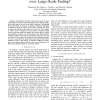26354 search results - page 140 / 5271 » How we refactor, and how we know it |
AUIC
2004
IEEE
14 years 2 months ago
2004
IEEE
It is becoming increasingly common for user interfaces to use zooming visual effects that automatically adapt to user actions. The MacOs X `dock' icon panel, for instance, us...
CHI
2009
ACM
14 years 11 months ago
2009
ACM
We developed a low-effort interaction method called Click2Tag for social bookmarking. Information foraging theory predicts that the production of tags will increase as the effort ...
CHI
2006
ACM
14 years 10 months ago
2006
ACM
People display adaptive language behaviors in face-to-face conversations, but will computer users do the same during HCI? We report an experiment (N=20) demonstrating that users&#...
HICSS
2010
IEEE
14 years 5 months ago
2010
IEEE
The ability to retain and lock members in competitive situations is an important concern of online social network sites. In this study, we proposed a research model to investigate...
ICC
2009
IEEE
14 years 5 months ago
2009
IEEE
Abstract—In multiuser diversity systems, the impact of largescale fading on the total system performance such as link quality and system power has not been widely addressed. Cons...



